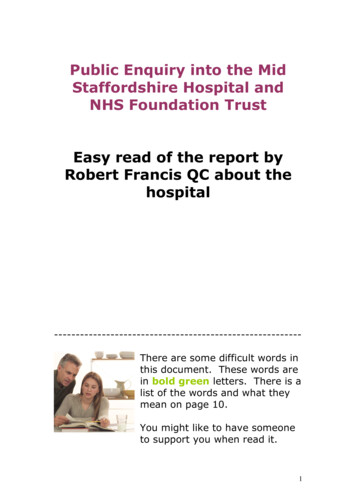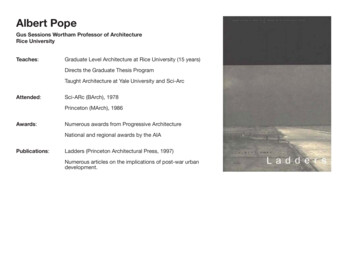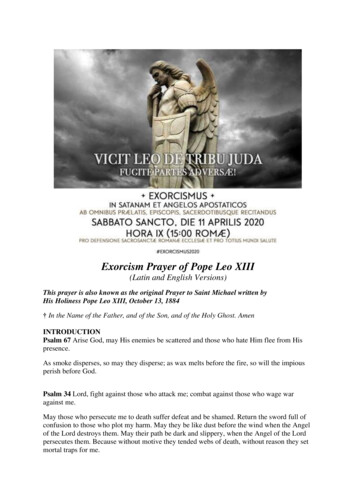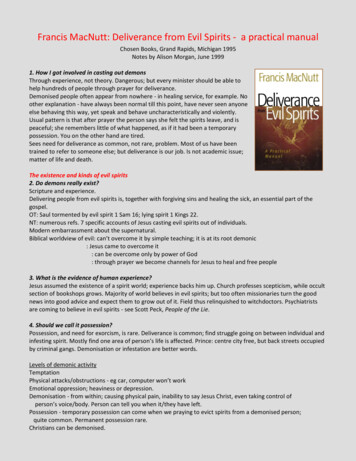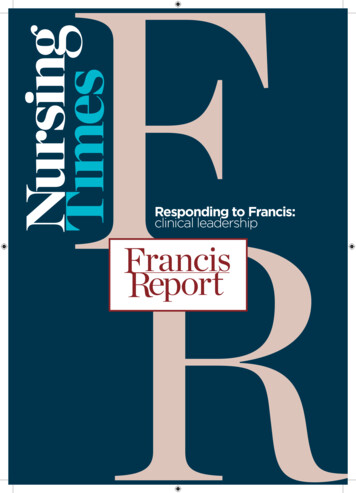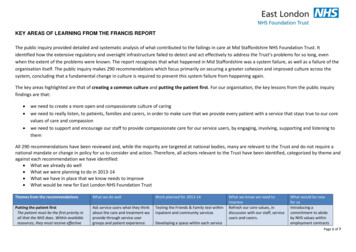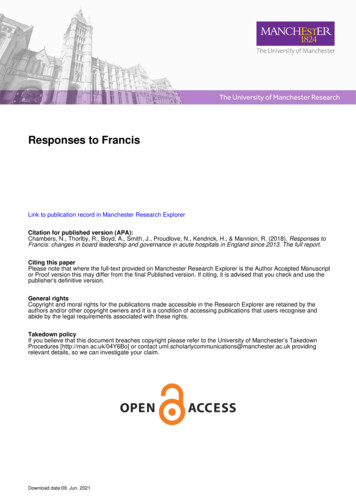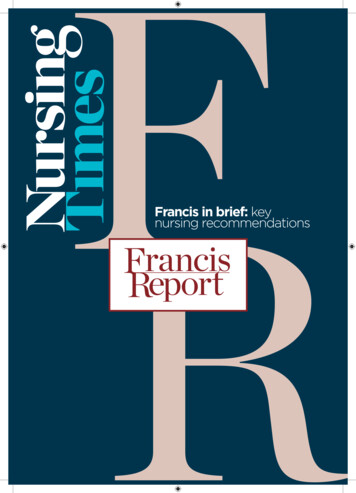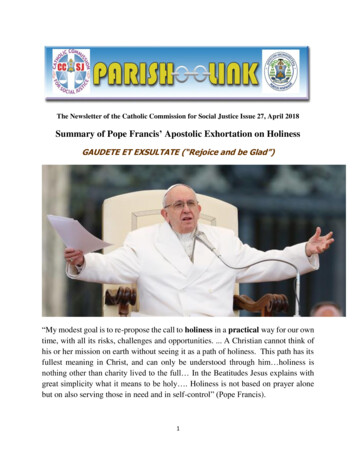
Transcription
The Newsletter of the Catholic Commission for Social Justice Issue 27, April 2018Summary of Pope Francis’ Apostolic Exhortation on HolinessGAUDETE ET EXSULTATE (“Rejoice and be Glad”)“My modest goal is to re-propose the call to holiness in a practical way for our owntime, with all its risks, challenges and opportunities. . A Christian cannot think ofhis or her mission on earth without seeing it as a path of holiness. This path has itsfullest meaning in Christ, and can only be understood through him holiness isnothing other than charity lived to the full In the Beatitudes Jesus explains withgreat simplicity what it means to be holy . Holiness is not based on prayer alonebut on also serving those in need and in self-control” (Pope Francis).1
INTRODUCTION BY CCSJ'S CHAIR, LEELA RAMDEEN: In this issue of ParishLink, CCSJ shares with you the official summary of Pope Francis' ApostolicExhortation GAUDETE ET EXSULTATE (‘Rejoice and Be Glad’), with the subtitle “Onthe call to holiness in the contemporary world.” It was distributed by the Holy See on Mon9 April, 2018 but is dated March 19, 2018 which marks the fifth anniversary of the HolyFather's inaugural Mass on the Feast of St. Joseph, March 19, 2013.The exhortationis Pope Francis’s fifth major document. He has issued two prior exhortations: EvangeliiGaudium ("The Joy of the Gospel") in 2013 and Amoris Laetitia ("The Joy of Love") in2016. He has also issued two papal encyclicals: Lumen Fidei, which was begun by PopeEmeritus Benedict XVI; and "Laudato Si', On Care for Our Common Home," whichfocused on environmental issues. In Gaudete et Exsultate, he reminds us that God wantsus "to be holy, as He is holy" (1 Pet 1:15).As Catholic News Agency says: "The 44-page exhortation explains that holiness is themission of every Christian, and gives practical advice for living out the call to holiness inordinary, daily life, encouraging the practice of the Beatitudes and performing works ofmercy.Francis said that all Catholics that, like the saints, 'need to see the entirety of yourlife as a mission,' and explained that this is accomplished by listening to God in prayerand asking the Holy Spirit for guidance in each moment and decision.“'A Christian cannot think of his or her mission on earth without seeing it as a path ofholiness,' he stated, explaining that this path has its 'fullest meaning in Christ, and canonly be understood through him.' Using the words of Pope Emeritus Benedict XVI, Franciswrote that 'holiness is nothing other than charity lived to the full.' As a result, the measureof our holiness stems not from our own achievement, but 'from the stature that Christachieves in us.'"Therefore, Pope Francis said, to walk the path of holiness requires prayer andcontemplation alongside action; the two cannot be separated.The pope explained that2
'the Church has repeatedly taught that we are justified not by our own works or efforts,but by the grace of the Lord, who always takes the initiative,' and that even ourcooperation with the gift of divine grace is itself 'a prior gift of that same grace.'"Some may be asked, through God’s grace, for grand gestures of holiness – as can beseen in the lives of many of the saints, Francis said – but many people are called to livethe mission of holiness in a more ordinary way, and in the context of theirvocation. However large or small one’s call seems, Francis said that acts of charity arealways undertaken 'by God’s grace,' not as people 'sufficient unto ourselves, but rather asgood stewards of themanifold grace of God (1 Peter 4:10),' he said."The pope offered several practical recommendations for living out these 'small gestures.'In addition to the frequent reception of the sacraments and attendance at Mass, he saidthat in the Beatitudes Jesus explains 'with great simplicity what it means to be holy.' Healso said that a way to practice holiness is through the works of mercy, though he warnedthat to think good works can be separated from a personal relationship with God andopenness to grace is to make Christianity into 'a sort of NGO.'"The saints, on the other hand, show us that 'mental prayer, the love of God and thereading of the Gospel' in no way detract from 'passionate and effective commitment totheir neighbours.' The pope highlighted several qualities he finds especially important forliving holiness in today’s culture, including: perseverance, patience, humility, joy, a senseLeela Ramdeenof humour, boldness, and passion."“To be saints is not a privilege forthe few but a vocation for everyone.” (Pope Francis)3
Summary of Pope Francis’holiness, Gaudete et ExsultateApostolicExhortationonCHAPTER 1: THE CALL TO HOLINESSThere are many kinds of saints. Besides the Church’s officially recognized saints, manymore ordinary people have been hidden from history books yet have been decisive inchanging the world. They include many Christian witnesses whose martyrdom is a featureof our time. “Each saint is a mission, planned by the Father to reflect and embody, at aspecific moment in history, a certain aspect of the Gospel.” Holiness is experiencing themysteries of Christ’s life, “constantly dying and rising anew with him”, and reproducingaspects of his earthly life: his closeness to the outcast, his poverty, his self-sacrificinglove. “Allow the Spirit to forge in you the personal mystery that can reflect Jesus Christ intoday’s world”, in a mission to build the kingdom of love, justice and universal peace.Holiness is as diverse as humanity; the Lord has in mind a particular path for eachbeliever, not just the clergy, the consecrated, or those who live a contemplative life. Weare all called to holiness, whatever our role, “by living our lives with love and bearingwitness”, and in the everyday turning to God. Among ways of bearing witness are“feminine styles of holiness”, of famous women saints and the “unknown and forgotten”women who daily transform their communities. As well as through big challenges,holiness grows through small gestures: refusing to gossip, listening with patience andlove, saying a kind word to a poor person.4
Holiness keeps you faithful to your deepest self, free from every form of enslavement,and bearing fruit for our world. Holiness does not make you less human, since it is anencounter between your weakness and the power of God’s grace. But we need momentsof solitude and silence before God, to face our true selves and let the Lord enter.CHAPTER 2: TWO SUBTLE ENEMIES OF HOLINESSGnosticism and Pelagianism, two “false forms of holiness” from early Church history, stilllead us astray. These heresies propose “an anthropocentric immanentism disguised asCatholic truth” by exaggerating human perfection without grace.Gnostics fail to realize that our perfection is measured by the depth of our charity, not byinformation or knowledge. Separating intellect from the flesh, they reduce Jesus’steaching to a cold and harsh logic that seeks to dominate everything. But doctrine “is nota closed system, devoid of the dynamic capacity to pose questions, doubts, inquiries”.Christian experience is not a set of intellectual exercises; true Christian wisdom can neverbe separated from mercy towards our neighbour.5
The same power that Gnosticism attributed to the intellect, Pelagianism attributed to thehuman will, to personal effort. Though modern Pelagians speak warmly of God’s grace,they suggest that human will is something pure, perfect, all-powerful, to which grace isthen added. They fail to realize that in this life human weaknesses are not healedcompletely and once for all by grace.Grace builds on nature. It does not make us superhuman but takes hold of us andtransforms us progressively. If we reject this historical and progressive reality, we canactually refuse and block the grace of the Lord. His friendship infinitely transcends us: wecannot buy it with our works, it can only be a gift born of his loving initiative. Only thispermits us to cooperate by our own efforts in our progressive transformation.When they overvalue human will and their own abilities, some Christians can tendtowards obsession with the law; an absorption with social and political advantages;punctilious concern for the Church’s liturgy, doctrine and prestige; vanity about the abilityto manage practical matters; and an excessive concern with programmes of self-help andpersonal fulfilment as well as certain rules, customs or ways of acting. The life of theChurch can become a museum piece or the possession of a select few. This deprivesthe Gospel of its simplicity, allure and savour, and reduces it to a blueprint that leaves fewopenings for the working of grace.6
CHAPTER 3: IN THE LIGHT OF THE MASTERThe Beatitudes are Jesus’s portrayal of what it means to be holy in our daily lives. Here“happy” and “blessed” become synonymous with “holy”. We gain true happiness byfaithful practice of the Beatitudes. We can only practice them if the Holy Spirit fills us withhis power and frees us from our weakness, selfishness, complacency and pride.Pope Francis describes each of the Beatitudes and their invitation, concluding eachsection “Being poor of heart: that is holiness.” “Reacting with meekness and humility: that is holiness.” “Knowing how to mourn with others: that is holiness.” “Hungering and thirsting for righteousness: that is holiness.” “Seeing and acting with mercy: that is holiness.” “Keeping a heart free of all that tarnishes love: that is holiness.” “Sowing peace all around us: that is holiness.” “Accepting daily the path of the Gospel, even though it may cause us problems: thatis holiness.”7
In the twenty-fifth chapter of Matthew’s Gospel (vv. 31-46), Jesus expands on theBeatitude about mercy. “If we seek the holiness pleasing to God’s eyes, this text offersus one clear criterion on which we will be judged.” When we recognize Christ in the poorand the suffering, we see into the very heart of Christ, his deepest feelings and choices.“Our Lord made it very clear that holiness cannot be understood or lived apart from thesedemands”.Misleading ideologies can lead us on the one hand to separate these Gospel demandsfrom their personal relationship with the Lord, so that Christianity becomes a sort of NGOstripped of the luminous mysticism so evident in the lives of saints. On the other hand,there are those who dismiss the social engagement of others as superficial, worldly,secular, materialist, communist or populist; their own particular ethical preoccupationoutweighs all others.Our defence of the innocent unborn, for example, needs to be clear, firm and passionate,for at stake is the dignity of a human life, which is always sacred and demands love foreach person, regardless of his or her stage of development. But “equally sacred” are thelives of the poor, the destitute, the abandoned and underprivileged; the infirm and elderly8
exposed to covert euthanasia; victims of human trafficking and new forms of slavery. Norshould the situation of migrants be a lesser issue compared to “grave” bioethicalquestions. For a Christian “the only proper attitude is to stand in the shoes of thosebrothers and sisters of ours who risk their lives to offer a future to their children.”CHAPTER 4: SIGNS OF HOLINESS IN TODAY’S WORLDThe Pope speaks next about “certain aspects of the call to holiness that I hope will proveespecially meaningful”, in the form of “five great expressions of love for God andneighbour that I consider of particular importance in the light of certain dangers andlimitations present in today’s culture.”1) Perseverance, patience and meekness.This describes the inner strength, grounded in God, that makes it possible to give awitness of constancy in doing good. We need to recognize and combat our aggressiveand selfish inclinations. Christians “can be caught up in networks of verbal violencethrough the internet and the various forums of digital communication.” Even in Catholicmedia, limits can be overstepped, defamation and slander can become commonplace. “Itis striking that at times, in claiming to uphold the other commandments, they completelyignore the eighth, which forbids bearing false witness or lying, and ruthlessly vilify others.”It is not good when we look down on others like heartless judges, lording it over them andalways trying to teach them lessons. That is itself a subtle form of violence.9
Being on the path to holiness means enduring “daily humiliations”, e.g. “those who keepsilent to save their families, who prefer to praise others rather than boast aboutthemselves, or who choose the less welcome tasks, at times even choosing to bear aninjustice so as to offer it to the Lord.” To act in this way “presumes a heart set at peaceby Christ, freed from the aggressiveness born of overweening egotism.”2) Joy and a sense of humourThe saints are joyful and full of good humour. They radiate a positive and hopeful spirit,even in hard times. Ill humour is no sign of holiness. Sadness can be a sign of ingratitudefor God’s gifts. Today’s individualistic and consumerist culture does not dispense real joy;consumerism only bloats the heart.3) Boldness and passionHoliness is also parrhesía: boldness, an impulse to evangelize and to leave a mark in thisworld. “Boldness and apostolic courage are an essential part of mission.” If we dare to goto the fringes, we will find Jesus already there, in the hearts of our brothers and sisters,in their wounded flesh, their troubles and their profound desolation.More than bureaucrats and functionaries, the Church needs passionate missionaries,enthusiastic about sharing true life. The saints surprise us, they confound us, because bytheir lives they urge us to abandon a dull and dreary mediocrity. The Holy Spirit allows usto contemplate history in the light of the risen Jesus. In this way, the Church will not standstill, but constantly welcome the Lord’s surprises.10
4) In communityGrowth in holiness is a journey of living an
Summary of Pope Francis . Evangelii Gaudium ("The Joy of the Gospel") in 2013 and Amoris Laetitia ("The Joy of Love") in 2016. He has also issued two papal encyclicals: Lumen Fidei, which was begun by Pope Emeritus Benedict XVI; and "Laudato Si', On Care for Our Common Home," which focused on environmental issues. In Gaudete et Exsultate, he reminds us that God wants us "to be holy, as He is .

